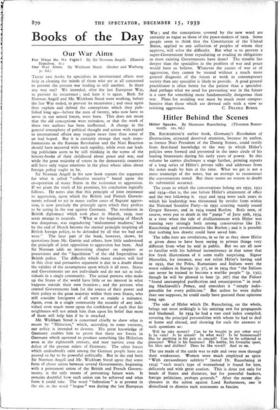Books of the Day
Our War Aims
THESE two books by specialists in international affairs may
help in clearing the minds of those who are at all concerned to prevent the present war leading to still another. Is there any way out? We intended, after the last European War, to prevent its recurrence ; and here it is again. Both Sir Norman Angell and Mr. Wickham Steed were working, before the last War ended, to prevent its recurrence ; and once again they explain and defend the conceptions which they pub- lished long ago—before the men of twenty, who now have to serve in our armed forces, were born. This does not mean that the old conceptions were mistaken, or that the work of these two authors has been ineffectual. A change in the general atmosphere of political thought and action with regard to international affairs may require more time than some of us had hoped. But it is certainly strange that such trans- formations as the Russian Revolution and the Nazi Reaction should have occurred with such rapidity, while even our lead- ing politicians seem to be still thinking in the terms of the history-books of their childhood about peace and war, and while the great majority of voters in the democratic countries still have only vague emotions in the place where ideas about foreign policy ought to be.
Sir Norman Angell in his new book repeats the argument for what is called " collective security " based upon the co-operation of many States in the resistance to aggression.
If we grant the truth of his premises, his conclusion logically follows. He notes also that this principle of joint resistance to aggression, upon which the British and French Govern- ments refused to act in many earlier cases of flagrant aggres- sion, is now precisely the principle upon which they profess to be acting in the war against Germany. The revolution in British diplomacy which took place in March, 1939, may seem strange to neutrals. " What at the beginning of March was dangerous, was engendering ' midsummer madness,' had by the end of March become the eternal principle inspiring all British foreign policy, to be defended by all that we had and were." The later part of the book, however, shows, by quotations from Mr. Garvin and others, how little understood the principle of joint opposition to aggression has been. And Sir Norman adds an interesting chapter on empires as possessions and the " liquidation " of the old Imperialism in British policy. The difficulty which many readers will feel in this clear and persuasive argument is due to a doubt about the validity of the assumptions upon which it all rests. States and Governments are not individuals and do not act as indi- viduals in a single community. The actual persons who make up the States of the world have little or no interest in what happens outside their own frontiers ; and the persons who control Governments look for the source of their power and their policy to the great majority within their own States, who still consider foreigners of all sorts as mainly a nuisance. Again, even in a single community the security of any indi- vidual rests much more upon the confidence of each that his neighbours will not attack him than upon his belief that most of them will help him if he is attacked.
Mr. Wickham Steed is concerned chiefly to show what is meant by " Hitlerism," which, according to some versions, our policy is intended to destroy. His great knowledge of Germany enables him to prove that there are forces in Germany which operated to produce something like Hitlerism even in the eighteenth century, and may survive even the defeat of the present rulers of Germany. The other forces which undoubtedly exist among the German people have not proved so far to be powerful politically. But in the end both Sir Norman Angell and Mr. Wickham Steed agree that some form of closer union between several Governments, beginning with a permanent union of the British and French Govern- ments, is the only means of preventing future wars. It remains doubtful how such union can be achieved and what form it could take. The word " federation " is at present in the air, as the word " league " was during the last European War ; and the conceptions covered by the new word are certainly as vague as those of the peace-makers of 1919. Some people seem to think that the Constitution of the United States, applied to any collection of peoples of whom they approve, will solve the difficulty. But what is to prevent a super-Government from repudiating or evading its obligations as most existing Governments have done? The trouble lies deeper than the specialists in the problem of war and peace would have us believe. Whatever the causes of war or of aggression, they cannot be treated without a much more general diagnosis of the forces at work in contemporary society than any specialist is likely to provide. A good general practitioner is often better for the patient than a specialist. And perhaps what we need for preventing war in the future is a cure for something more fundamentally dangerous than war. Plans for avoiding war must be much more compre- hensive than those which are devised only with a view to








































 Previous page
Previous page